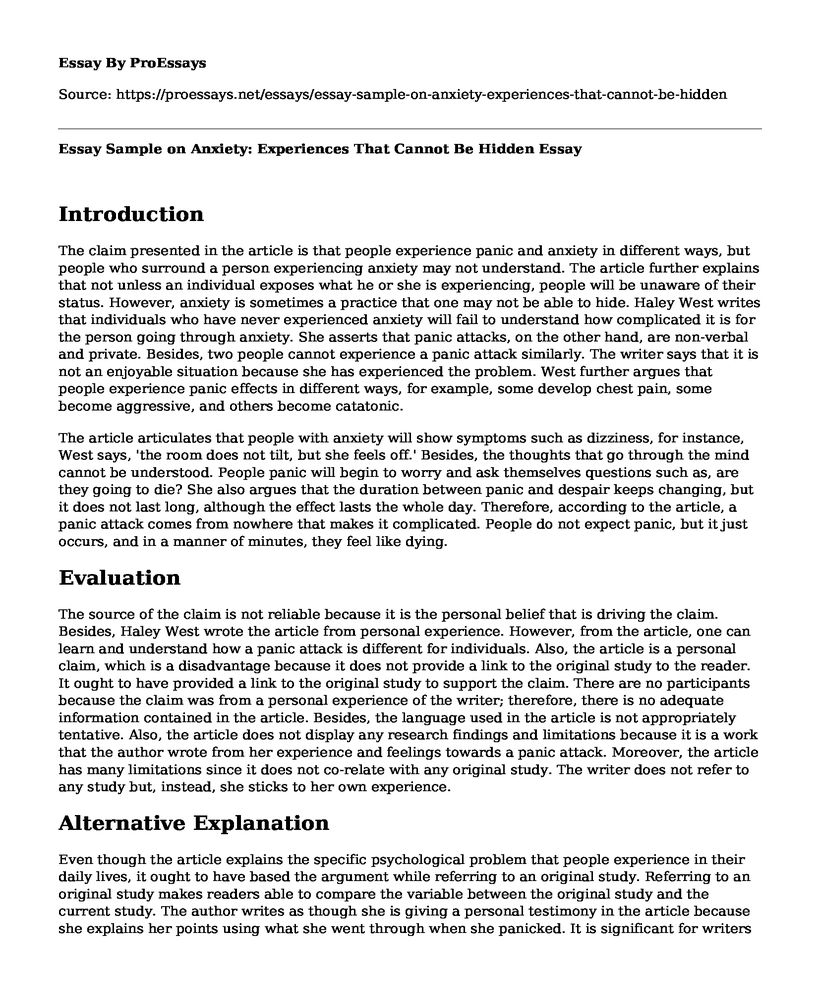Introduction
The claim presented in the article is that people experience panic and anxiety in different ways, but people who surround a person experiencing anxiety may not understand. The article further explains that not unless an individual exposes what he or she is experiencing, people will be unaware of their status. However, anxiety is sometimes a practice that one may not be able to hide. Haley West writes that individuals who have never experienced anxiety will fail to understand how complicated it is for the person going through anxiety. She asserts that panic attacks, on the other hand, are non-verbal and private. Besides, two people cannot experience a panic attack similarly. The writer says that it is not an enjoyable situation because she has experienced the problem. West further argues that people experience panic effects in different ways, for example, some develop chest pain, some become aggressive, and others become catatonic.
The article articulates that people with anxiety will show symptoms such as dizziness, for instance, West says, 'the room does not tilt, but she feels off.' Besides, the thoughts that go through the mind cannot be understood. People panic will begin to worry and ask themselves questions such as, are they going to die? She also argues that the duration between panic and despair keeps changing, but it does not last long, although the effect lasts the whole day. Therefore, according to the article, a panic attack comes from nowhere that makes it complicated. People do not expect panic, but it just occurs, and in a manner of minutes, they feel like dying.
Evaluation
The source of the claim is not reliable because it is the personal belief that is driving the claim. Besides, Haley West wrote the article from personal experience. However, from the article, one can learn and understand how a panic attack is different for individuals. Also, the article is a personal claim, which is a disadvantage because it does not provide a link to the original study to the reader. It ought to have provided a link to the original study to support the claim. There are no participants because the claim was from a personal experience of the writer; therefore, there is no adequate information contained in the article. Besides, the language used in the article is not appropriately tentative. Also, the article does not display any research findings and limitations because it is a work that the author wrote from her experience and feelings towards a panic attack. Moreover, the article has many limitations since it does not co-relate with any original study. The writer does not refer to any study but, instead, she sticks to her own experience.
Alternative Explanation
Even though the article explains the specific psychological problem that people experience in their daily lives, it ought to have based the argument while referring to an original study. Referring to an original study makes readers able to compare the variable between the original study and the current study. The author writes as though she is giving a personal testimony in the article because she explains her points using what she went through when she panicked. It is significant for writers to reference original studies to enable readers to refer and compare the points they are communicating. Also, referring to original studies assists readers in understanding the points.
Cite this page
Essay Sample on Anxiety: Experiences That Cannot Be Hidden. (2023, Mar 12). Retrieved from https://proessays.net/essays/essay-sample-on-anxiety-experiences-that-cannot-be-hidden
If you are the original author of this essay and no longer wish to have it published on the ProEssays website, please click below to request its removal:
- Film Analysis Essay on The New Asylums: Treatment Of Mentally Ill Offenders
- Suicidal Crime Paper Example
- How Successful People Become Motivated Essay Example
- Research Paper on Childhood Trauma and Loss
- Dr. Remo's 4 Interventions: Combining Pharmacological & Behavioral Therapies - Essay Sample
- My Spiritual Journey: Struggles, Successes, and Turning Points - Essay Sample
- Cognitive Ability: 100% Innate or Learned? - Free Essay Example







